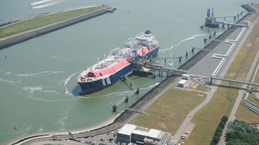
Port of Rotterdam said volumes handled at the port in the first nine months of the year were "almost the same" as last year, although with major differences due to the war in Ukraine, the sanctions against Russia, and the changes in global energy flows.
Europe's busiest port said it handled 351 million tonnes in the January to September period, up 0.3% compared to the same period last year with some underlying major differences as mentioned.
For instance, the port noted that considerably higher volumes of coal and LNG were imported as alternatives to Russian natural gas. Container transhipment decreased, especially as a result of the loss of trade with Russia.
"The total volume makes it seem as if it is business as usual in the port, but the big changes, especially with respect to LNG and coal, indicate that the energy landscape has changed dramatically," said Allard Castelein, CEO of Port of Rotterdam Authority.
"With the high energy prices, the energy-intensive chemical industry in particular is going through hard times. A faster energy transition makes us less dependent on geopolitical developments in the long term."
"In the short term, we have to do all we can to retain the chemical industry that is so important to our society," he added.
In terms of dry bulk, Port Rotterdam said the throughput of iron and scrap decreased steeply (-17.9%), as did the throughput of agribulk (-14.8) with the former caused by the weakening economy, the latter by the volumes of harvests in various parts of the world.
The throughput of dry bulk increased by 2.9% in total.
For liquid bulk, the increase was 3.9%. Port of Rotterdam said all categories in the other liquid section show growth: chemistry, biofuels, vegetable/animal oils and fruit juices, and the growth of LNG volume was very strong (+73.8%).
"Much more LNG is supplied from the United States and other countries to replace Russian natural gas, which previously was piped to Northwestern Europe," it noted.
Container volume down 8.6%
For the nine months period, Port of Rotterdam said the container segment dropped by 8.6% in total weight and by 4.4% in the number of containers (TEUs, twenty-foot equivalent units).
It noted that as a consequence of the sanctions, container traffic between Russia and Rotterdam has almost come to a standstill.
In the past few years, about 8% of container traffic was related to Russia.
The difference between tonnes (-8.6%) and TEUs (-4.4%) is because proportionally more empty containers found their way via Rotterdam. Although it added that container logistics is still hampered by disruptions as many vessels do not arrive on schedule and due to the high-capacity usage of the terminals, the volume decrease does lead to logistic problems gradually becoming smaller.
The container freight rates have also dropped significantly.
"The macro-economic climate looks all but promising, what with the continuing war in Ukraine, inflation, and the deteriorated economic climate," the port added.
"The Port of Rotterdam Authority expects transhipment volume for 2022 to be of the same level as that of last year. Given the highly challenging circumstances in almost all sectors, this would be a remarkable performance for the Rotterdam business community."



